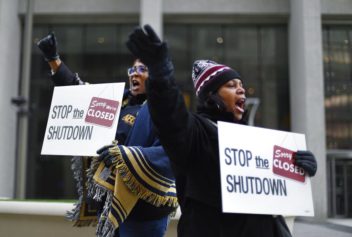Now that the government shutdown process has begun, people are scrambling to figure out how it impacts them.
Congress has yet to approve funding bills to keep the government functioning, with the exception of a bill to keep the military operating. In what may have been an overly optimistic hope that the shutdown wouldn’t happen, federal employees were not even sent a formal letter outlining the consequences.
In fact, some 800,000 were required to show up for work on Tuesday to pick up letters telling them that they were furloughed. Another 1 million federal employees are being asked to continue working without pay during the shutdown.
However, in anticipation of the crisis, the National Military Family Association prepared a list of the most frequently asked questions and answers to what would happen to military personnel and their families if the government indeed shut down.
The association’s answers address issues for service members, but many of these same issues likely are of interest to civilians, who should check with their human resource departments, banks, creditors, etc.
Service members are still required to report to work during the shutdown. They were scheduled to receive their Oct. 1 paychecks, but their Oct. 15 checks will be delayed if no funding bill is passed by Oct. 9.
That raises the question of what private employers, especially government contractors, will require of their staffs.
Some military banks and credit unions may waive fees associated with the possible shutdown. Others have stated they will consider permitting families to skip a loan or credit card payment.
“In the event of a government shutdown, the military banks will respond, as they have in the past when faced with natural disasters and pending government shutdowns, by providing tailored, case-by-case assistance to their military and civilian customers,” the Association of Military Banks of America said in a statement.
“They are well aware of the impact of a government shutdown on the Department of Defense, and understand that service members and civilian employees will be affected. A similar shutdown was threatened in April 2011 and the military banks stood ready then to support their military and civilian customers. If you are in need of assistance, please contact your military bank for more information.”
What is the likelihood that a commercial bank would be willing to do the same for its customers? It may be worth checking to see if your bank will not impose various fees or if it will require documentation that you are in financial distress because of the shutdown.
Those who have automatic payments taken from certain accounts would do well to contact their banks and make arrangements, or consider transferring money between accounts to cover automatic payments.
The National Association of Federal Credit Unions has a list of credit unions that will help members if a shutdown occurs. Assistance may include interest-free advance credit of direct deposits, loan payment deferment and payment reductions.
Civilians might want to check with their credit unions as well.
The military association warns families not to turn to payday lenders and instead try to work with military aid organizations, banks, credit unions and military banks to address financial difficulties. That seems to be sound advice, even with no government shutdown concerns. Payday lenders charge exorbitant interest rates and have employed practices that make it hard for a customer to end a relationship with the lender.
Military retirees may find their checks delayed or reduced. That would also affect other federal retirees, in the event of a shutdown.
Appointments at military hospitals and clinics may be canceled and some lab and pharmacy services may not be available. And if a service member “dies during a lapse in funding, the death benefit will be delayed,” according to the association statement.
Essential civilian personnel may be required to work and will be paid retroactively once a funding bill is approved. Other civilian employees, however, may be furloughed in the event of a shutdown.
Many military families rely on commissaries, which help keep costs down, especially if only one adult in the family is working and may be deployed out of the country. If a shutdown occurs, commissaries close throughout the U.S., including Alaska and Hawaii, but will remain open overseas.
Eventually, most folks assume, federal employees will be made whole somehow once Congress approves funding bills restoring government services. What happens to everyone else in related and private industries, however, is a big question mark.
Jackie Jones, a journalist and journalism educator, is director of the career transformation firm Jones Coaching LLC and author of “Taking Care of the Business of You: 7 Days to Getting Your Career on Track.”


